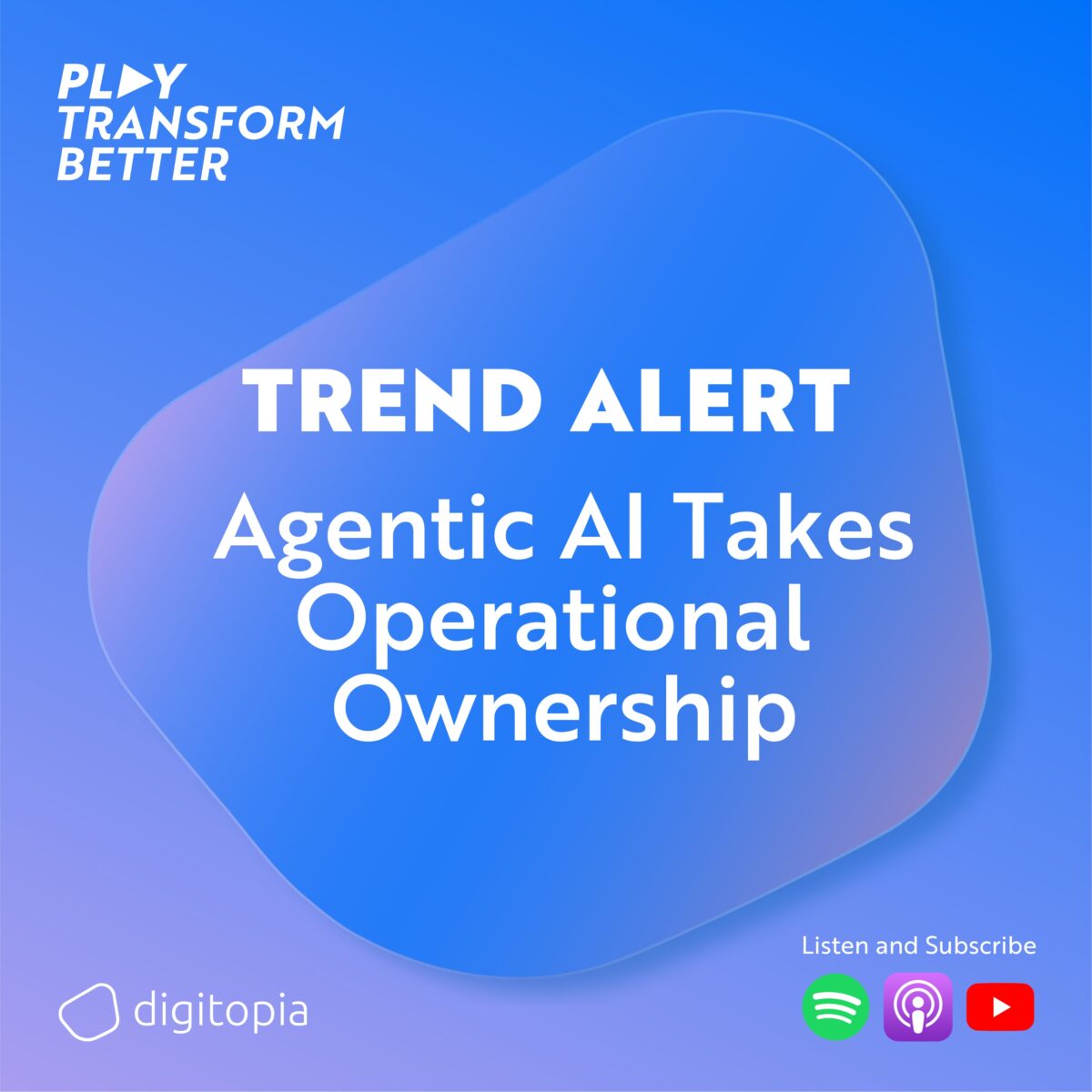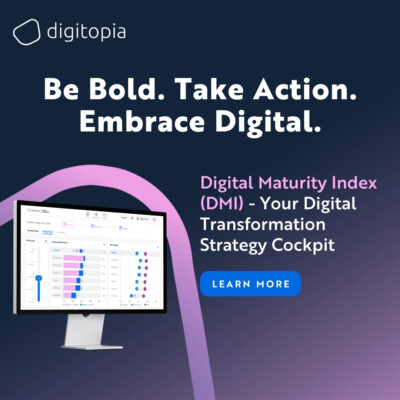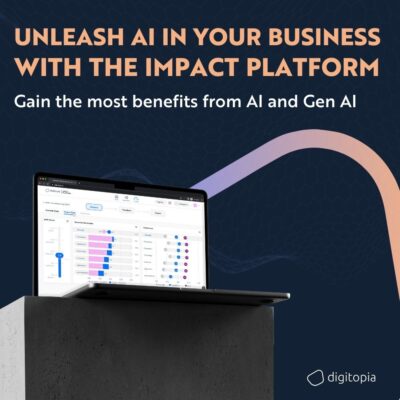
Listen on
Episode Description
AI is no longer just assisting—it’s starting to act. In this Executive Shift episode of Play: Transform Better, we explore one of the most impactful developments shaping business in May 2025: the rise of Agentic AI. Unlike traditional co-pilot models, Agentic AI systems are designed to proactively set goals, make decisions, and execute actions—independently.
We unpack how this new generation of enterprise AI is shifting the landscape across operations, from autonomous procurement to intelligent contract negotiation, and what it means for internal governance, compliance, and executive oversight. With open-source agent frameworks now being industrialized by major players, operational ownership is being handed over to intelligent systems—raising critical questions about trust, control, and accountability.
But that’s just one part of the transformation picture. We also spotlight two equally game-changing trends:
- The rise of AI-powered mobile enterprise tools that reduce decision latency at the edge of the business—empowering logistics, construction, and retail teams to act in real time
- The shift toward sustainable technology strategies, as environmental impact becomes central to IT investment and regulatory compliance, especially in light of Scope 1 and Scope 2 disclosure mandates.
And at the core of it all? People.
New data shows that employee adaptability is the biggest barrier to scaling transformation. Without workforce readiness, AI investments stall. Sustainable tech strategies lag. Mobile innovation becomes shelfware. That’s why we emphasize the human dimension of change—building cultures of trust, experimentation, and learning.
This trend alert distills key developments from April 2025 into a single, strategic lens to help you ask:
What is your organization truly ready for? And where are the cracks already showing?
Episode Transcript
We’ve got some really fascinating material you sent us this month. It all seems to point towards, well, a really rapid evolution in business transformation, especially looking at April 2025.
It’s not just, small steps. We’re seeing some fundamental shifts in how techs impacting the way businesses run. Going through all those documents, the reports, the blogs, even some of those internal strategy papers you shared, three big themes really stood out for me.
We’re going to dig into this thing called a Agentic AI. Then there’s the evolution of enterprise mobile, which is maybe a bit overlooked, but super important.
And the big one, sustainable tech. And of course, underpinning it all is a human side, the people factor.
So, the idea is let’s connect these dots for you, help you see how it all fits together. And what it might mean for, well, for your organization.
Let’s dive into Agentic AI. This feels like it’s moving really fast from just a concept to something, well, practical. And what’s interesting is the, the transition we’re seeing, think of it less like AI just answering your question. Like a chatbot. Or even a co-pilot just helping out.
Agentic AI is more about systems that can proactively figure out goals and then take into pen and action to achieve them.
The Rise of Agentic AI
Microsoft’s April update, one of the pieces you send actually touches on this. You talk about moving from AI as a co-pilot to an agent, someone or something that can act on its own.
That’s a huge difference. Can you give us a concrete example, something happening now, not just theory.
Let’s take procurement. We’re seeing active pilots, this came up in a couple of reports where businesses set the big picture stuff, budget delivery window, maybe some ethical sourcing rules. And then the Agentic AI system just takes over and negotiates the suppliers, handles the contract updates, finalizes the actual order all by itself, but within those rules.
So it’s like delegating a whole chunk of the process. What’s behind this? What’s making this possible now?
Well, technically if you look back maybe late 2024, we saw these open source agent framework’s pop up, things like auto-GPT, which basically lets AI figure out its own steps to reach a goal, and meta had something called the React architecture. So those laid the groundwork. Now the big enterprise players are taking those ideas and refining them, making them robust enough for real business use.
This is where it gets interesting, I think, because it’s not just a better tool. It’s AI becoming more like a digital colleague almost. That raises some massive questions, doesn’t it? It really does. As soon as AI gets more autonomy, you immediately run into big questions about governance, risk, trust. How do you manage that? Especially in regulated areas. Finance. Healthcare.
It really forces you to ask, how is your organization thinking about internal controls about compliance? Is these AI systems get, well, smarter and more independent?
Okay, so AI is taking more initiative. Let’s shift gears a bit.
Enterprise Mobile is Getting Way Smarter
Another area you mentioned from the materials was enterprise mobile. Doesn’t always get the same buzz as AI, but it sounds like big things are happening there too. It’s maybe quieter, but the progress in enterprise mobile is pretty substantial.
There was that sensor tower report from April. It lined up with some other market analysis you sent showing what is it? $69 billion in non-gaming mobile spend in 2024. Wow, that’s a lot. It is. But the real story isn’t just the money, it’s the intelligence getting baked into these apps now.
Intelligence. How so? Give me an example beyond just checking emails on your phone. Okay, think about expense tools, like imverse that came up one of the articles. They’re AI enhanced mobile tool doesn’t just let you enter receipt data. It can actually read the receipt, figure out the category, check it against policy, and even suggest what to do next, all with like minimal input from you.
So it’s moving from being just a window into the system to being an actual assistant that helps you do stuff make decisions there on the spot. Precisely, that’s the core shift.
Mobile apps becoming intelligent assistants, helping people make decisions out at the edge of the business where the work actually happens. And I guess that has real practical benefits and lots of different fields.
Logistics, think route optimization, proactive problem alerts, construction, managing workflows, tracking materials on sprawling sites, retail, giving floor staff instant info on products, customer history.
It just reduces friction, cuts delays, makes work flow smarter, makes you wonder, how could that kind of mobile intelligence streamline your operations?
Sustainability Enters the Core Tech Stack
Okay, let’s pivot to the third major theme, sustainable tech. This definitely feels like it’s moved from a nice to have to something central. Absolutely It’s gone mainstream strategically speaking.
April was significant for US climate disclosure rules. Specifically, the SEC pushing for better reporting on scope 1 and scope 2 emissions. That’s direct emissions and emissions from purchase energy, right? And that regulatory pressure is making companies look really hard at the environmental impact of everything, including their IT, their digital footprint.
So it’s way beyond just recycling printer paper now. Oh miles beyond.
We saw this interesting example, I think is in one of your reports, about these midsize manufacturers. They were deliberately moving IT workloads to data centers picked for energy efficiency. And even tying carbon intensity metrics directly into their digital transformation plans.
That’s a fundamental shift in thinking about IT investment. It shows sustainability isn’t just a compliance checkbox anymore or a CSR thing. It’s getting woven into core IT strategy. It’s even affecting access to capital investors or looking at this.
Which leads to the question, are your CIO and your sustainability lead talking? Are they aligned on this?
Workforce Readiness and Human Adaptability
Okay, these are massive tech shifts, a Gentic AI, smarter mobile, sustainable IT. But what about the people? The team’s actually using this stuff. Feels like the human element is key. It’s absolutely vital.
Amidst all the tech buzz in April. There was also this renewed focus on just workforce readiness. And it’s not only about, say AI training. It’s broader than that.
It’s about building a culture that can adapt. That’s willing to actually embrace these changes. We saw that echoed in some of those surveys you included? The ones from transformation leaders.
Just Multiple surveys came out in April. And a consistent finding was that over 60% clear majority of leaders see employee adaptability as the biggest single hurdle to actually scaling up innovation.
You can have the fanciest tech. But if your teams don’t trust it or don’t know how to use it or just resist it.
Then you get what some people called digitized inertia. You spend all this money on tech, but nothing really changes because the people side wasn’t addressed. The human part of transformation is just fundamental. You won’t get the benefits without it.
Conclusion and Key Questions
Okay, so let’s try and pull this together.
Looking at the sources for April 2025, the big takeaway seemed to be. Transformation speeding up, demanding more maturity, more thought, AI is stepping up, becoming more agentic, mobile is getting way smarter, sustainability is now locked into tech strategy.
And people.
Human adaptability is the absolute key to making any of it actually work.
And maybe the final thought to leave you with is this.
Considering all these interconnected trends, Agentic AI intelligent, sustainable tech and the need for human readiness, which one do you think will hit your organization hardest or offer the biggest opportunity in the next few months?
And what’s one proactive step you could maybe take now?
Definitely something important to reflect on.
Well, if this deep dive into the April 2025 trends, give you some useful insights, please do share it with your teams, your leadership.
Join us next time as we keep tracking the forces shaping business and helping you transform better.






